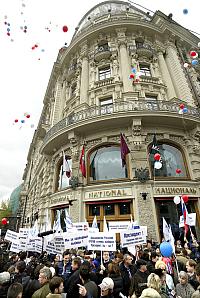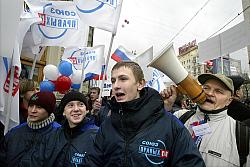 |
|
Vladimir Filonov / MT
An activist
denouncing Putin's plan to scrap direct gubernatorial elections at
the rally. |
A day before the State Duma was to consider in a first reading the much-criticized
Kremlin plan to scrap the popular vote for governors, hundreds of people
turned out at competing rallies Thursday in central Moscow to praise or
denounce the legislation.
Some 300 activists of the liberal Union of Right-Wing Forces party,
or SPS, gathered across the street from the Duma building to warn that
the change would threaten democracy and issue an appeal to Duma deputies
to reject the bill.
Across the Moscow River from the Kremlin, about 2,000 students and retirees
bused in by the pro-Kremlin United Russia party rallied in support of
the initiative and called for President Vladimir Putin's power to be further
strengthened. The crowd later swelled to more than 8,000 people, police
said, The Associated Press reported.
The Kremlin-controlled Duma is expected to easily pass the bill, which
replaces direct gubernatorial elections with a system under which the
president submits governors' names to regional legislatures for their
confirmation. Putin, in proposing the change last month, said the state
needs to be strengthened in response to the series of terrorist attacks
that killed more than 400 people in August and September.
At the SPS rally outside the National Hotel, protesters carrying balloons and
signs reading, "We're for Free Elections!" and "Abolishing
Elections Is a Violation of the Constitution," said the bill signals
a return to the Soviet past.
"Such initiatives will lead to a point when we will not participate
in any popular elections at all," said SPS activist Lidia Izvolskaya,
from Zelenograd, outside Moscow.
Ahead of the rally, organizers said they expected many opposition leaders
to show up, including former SPS leaders Boris Nemtsov and Irina Khakamada
and Yabloko leader Grigory Yavlinsky,
as well as Communist officials. However, only SPS supporters and its current
leaders attended.
"The idea behind this rally is to show that there are people who
disagree with what is going on," SPS leader Boris Nadezhdin said.
At Bolotnaya Ploshchad, students and retirees carried small signs reading,
"For!" and larger signs reading "United Power -- United
Russia!"
"I am here to support Vladimir Vladimirovich Putin and protest
against aggression," said Yevgeny Solovyev, a 64-year-old retiree,
AP reported.
Many young participants, however, had difficulty explaining the reason
for the demonstration. Some students said their professors had ordered
them to attend and told them they could not leave the rally without written
permission from United Russia organizers. Others said they had been told
that the rally was about education reforms.
 |
Vladimir Filonov /
MT
SPS activists releasing
balloons at a rally Thursday across the street from the Duma |
State-controlled television showed footage of the United Russia rally in
its early newscasts and ignored the SPS protest. By Thursday evening, though,
it was airing reports about both.
Channel One television said rallies supporting Friday's bill were also
held in many other cities.
In its afternoon newscast, the channel also showed footage of several
young men attending the pro-Putin demonstration who said they were members
of Yabloko.
Yabloko issued a statement saying none of its members had participated
in the event and threatened to sue Channel One.
The channel's coverage of the rally later in the day made no mention
of Yabloko.
The SPS rally, almost twice as large as sanctioned by city authorities,
was a far cry from the huge demonstrations with thousands of people that
it held several years earlier over alternative service and other Duma
legislation.
SPS, founded by liberals Yegor Gaidar and Anatoly Chubais, and Yabloko
failed to win enough votes in December's elections to get seats in the
Duma. Both parties have been teetering on the brink of collapse since.
The gubernatorial vote is the most controversial measure in a package
of Kremlin election amendments that the Duma will consider Friday. At
least two republics, Tatarstan and Bashkortostan, have voiced opposition
to the change, while the legislature in the Astrakhan region only backed
it after being asked three times to do so.
See also:
the original at
www.themoscowtimes.com
|